Inverted Intervals
Inverted intervals are simply intervals which have been turned upside down. To invert an interval just take the bottom note, and put it on the top!
Inverting perfect intervals
As you can see below by taking the C at the bottom of the interval and moving it above the G, the initial interval of a 5th turns into a 4th when turned upside down. A perfect interval always stays perfect when inverted.
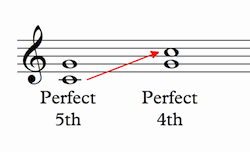
Major and minor inverted intervals
As you can see in the example below, when inverted, a major interval becomes a minor interval, and a minor interval becomes a major interval.
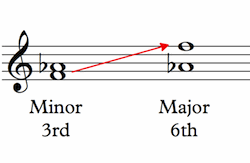
Inverting augmented and diminished intervals
The example below show the inversion of an augmented interval.When an augmented interval is inverted it becomes diminished and when a diminished interval is inverted it becomes augmented.
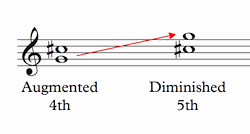
But why does it add up to 9
Many students are initially confused by the fact both intervals add up to 9. An octave has 8 notes, and there is an octave between the bottom note of the first and the top note of the inversion of the interval…so why does it add up to 9? The answer is that the note in the middle is counted twice. Remember we count both notes when calculating an interval, so the G has effectively been counted twice.
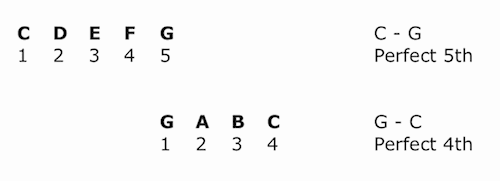
Why is this useful?
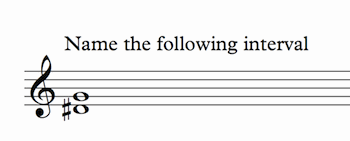
Learning how to invert intervals is very useful if you are confronted with working out an interval for which you do not know the scale. E.g. in the question below you would need to know the notes of the scale of D♯ major to work out the interval.
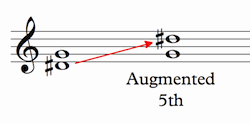
But, using inversion you can work out the interval in the key of G major (after inversion) and find the interval is an Augmented 5th.
All you need to know now is that Augmented becomes Diminished, and that a
5th must become a 4th because the intervals need to add up to 9! So therefore the answer is Diminished 4th, without even having to think about the D♯ major scale! And not having to work out the D♯ major scale is always a good thing!
Recap
When inverting an interval:Major becomes Minor and Minor becomes Major
Perfect stays Perfect
Augmented becomes Diminished and Diminished becomes AugmentedAnd remember the original and inverted interval should always add up to 9.
A unison becomes an octave and vice versa
A 2nd becomes a 7th and vice versa
A 3rd becomes a 6thand vice versa
A 4th becomes a 5thand vice versa
A Clear Path To Learning Music Theory
For more help check out my new theory book Essential Music Theory: Learn To Read And Appreciate Music Vol. 1 available for iPad and Mac OS.
- A simple step-by-step course that takes you from complete beginner to grade 2 music theory
- Multi-faceted learning - audio, video, mind maps, clear musical examples
- Built in quizzes to check your understanding
Click here for more information.
Or get it on the iBooks Store!
Return to Music Intervals from Inverted Intervals
Return to the Essential Music Theory Homepage
